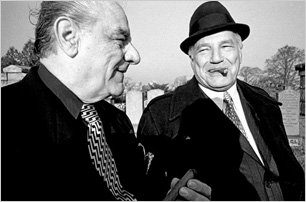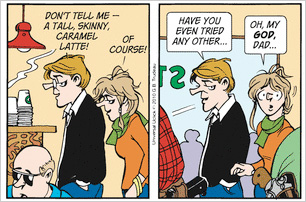
Flux=RadThe Pavement reunion and the end of baby boomer cultural hegemony.
Posted Thursday, March 18, 2010, at 4:20 PM ETAlso in Slate, Troy Patterson reviews Quarantine the Past, the new Pavement compilation.
 Five years ago, Jack Shafer wrote an essay in these pages asking a mischievous question: How will we know when baby boomers have lost control of American popular culture? "Sooner or later," Shafer predicted, "the post-boomers will give them the necessary nudge, push, and shove to sweep their rotting culture from the scene, and references to Beatles tracks will become as irrelevant as references to Mills Brothers songs." The question was, when? "What post-boomer reference in a mass-media headline or TV commercial will signal the cultural coup?"
Five years ago, Jack Shafer wrote an essay in these pages asking a mischievous question: How will we know when baby boomers have lost control of American popular culture? "Sooner or later," Shafer predicted, "the post-boomers will give them the necessary nudge, push, and shove to sweep their rotting culture from the scene, and references to Beatles tracks will become as irrelevant as references to Mills Brothers songs." The question was, when? "What post-boomer reference in a mass-media headline or TV commercial will signal the cultural coup?"
Well, how about this one? "Greatest. Indie-est. Band. Ever." The headline belongs to the latest issue of GQ, with apologies to The Simpsons' Comic Book Guy. ("The Simpsons should produce a heap of references in headlines, movies, music, and ads," Shafer foretold.) The band in question is Pavement—"the finest rock band of the '90s," according to the dean of American rock critics, Robert Christgau—who are reuniting this month for the first time since their 1999 breakup. GQ had the sensible idea of sending go-to generational representative Chuck Klosterman out to Portland, Ore., to ask Stephen Malkmus, the band's famously unforthcoming front man, a basic and essential question: why? Malkmus stops and starts a couple times, and then answers in the way that anyone who followed Pavement in the '90s knew he would. "Will it be fun for us? Will the people in the audience have fun? Who knows?" Malkmus told the reporter who was there, ostensibly, to help him promote the band's high-stakes reunion tour. "It's not like I'm gagging to get out there and play those songs."
This isn't what you'd expect to hear from an older band like the Rolling Stones, embarking on their umpteenth stadium-based cash bonanza. But from Malkmus this is about right. Pavement's indifference to fame, fortune, and fidelity (of both the sonic and interpersonal varieties; just ask Malkmus' band mates about the latter) is the thing for which they were most loved during their initial run. Malkmus, surveying the cultural landscape a decade later, can be sure that his unchanged attitude won't be lost on the ticket-buying public. Indeed, demand for the reunion was so strong that the first four shows the band announced for New York City sold out a full year in advance. It's a Pavement kind of world now.
To wit: In January, the politely spoken New York indie-rock band Vampire Weekend debuted at No. 1 on the Billboard charts, selling 124,000 copies of their sophomore record Contra and beating out everyone from the pop star Ke$ha to the boomer-goddess Susan Boyle to become, momentarily anyway, the most popular act in the country. Two weeks later, while echt-boomer act the Who got the Super Bowl XLIV halftime nod, the estimated 153 million people who tuned in to watch the game were also treated to repeated doses of "Wake Up," the yelpy 2004 anthem from Canadian indie darlings the Arcade Fire, which the NFL had licensed for the evening. (The band, in true indie fashion, donated the money to Haiti.) Volkswagen followed the NFL's lead, paying old-school music icon Stevie Wonder to act in the premiere of their minute-long "Punch Dub" spot, even as they handed over the soundtrack to the Brooklyn indie artists Grizzly Bear. All of these relatively new artists can claim a pretty direct lineage back to Pavement, and the music they make tends to appeal to teenagers from not just this past decade, but the aging ones from the prior two decades as well. The scale and reach may be new, but the sound is not, particularly.
Nor, of course, is the phenomena of indie-rock showing up in commercials, or on screens in general. Cadillac has used the in-demand sounds of both the electro house duo Justice and the peppy French band Phoenix in advertisements over the last couple years. Indie acts like Matt & Kim and the Dodos have helped shill for various beer and liquor companies. The recent films Where the Wild Things Are, Juno, and (500) Days of Summer—to name just a few—all employed indie songs to help convey a certain kind of emotional vulnerability and shyness; Juno went so far as to make New York proto-indie duo the Moldy Peaches' "Anyone Else but You" a minor plot point. Even the tween-targeted Twilight: New Moon looked to the indie world—as opposed to, say, the Jonas Brothers—for soundtrack help last year.
on the Fray
-
Health care bill will require new restaurant menus that include calorie counts http://bit.ly/cd7ZTF
-
Become a fan of Slate on Facebook http://bit.ly/4EGWiY Follow us on Google Buzz http://bit.ly/aanSOz
-
Haliburton withdraws appeal in Jamie Leigh Jones rape case http://bit.ly/dB9Dwh
 Shafer: What Ross Douthat Overlooks About Conspiracy Theorists
Shafer: What Ross Douthat Overlooks About Conspiracy Theorists Why Do Investors Keep Making Bad Bets Against Obama?
Why Do Investors Keep Making Bad Bets Against Obama?  Strange YouTube Trend: The Girls Who Want To Show You the Clothes They Just Bought
Strange YouTube Trend: The Girls Who Want To Show You the Clothes They Just Bought Slate's Sports Experts Size Up the Sweet 16
Slate's Sports Experts Size Up the Sweet 16 Companies Get Paid To Use Less Energy. Why Not Homeowners Like Me?
Companies Get Paid To Use Less Energy. Why Not Homeowners Like Me? Obama's Bold Plan To Fix America's Lousy Internet Connection
Obama's Bold Plan To Fix America's Lousy Internet Connection














